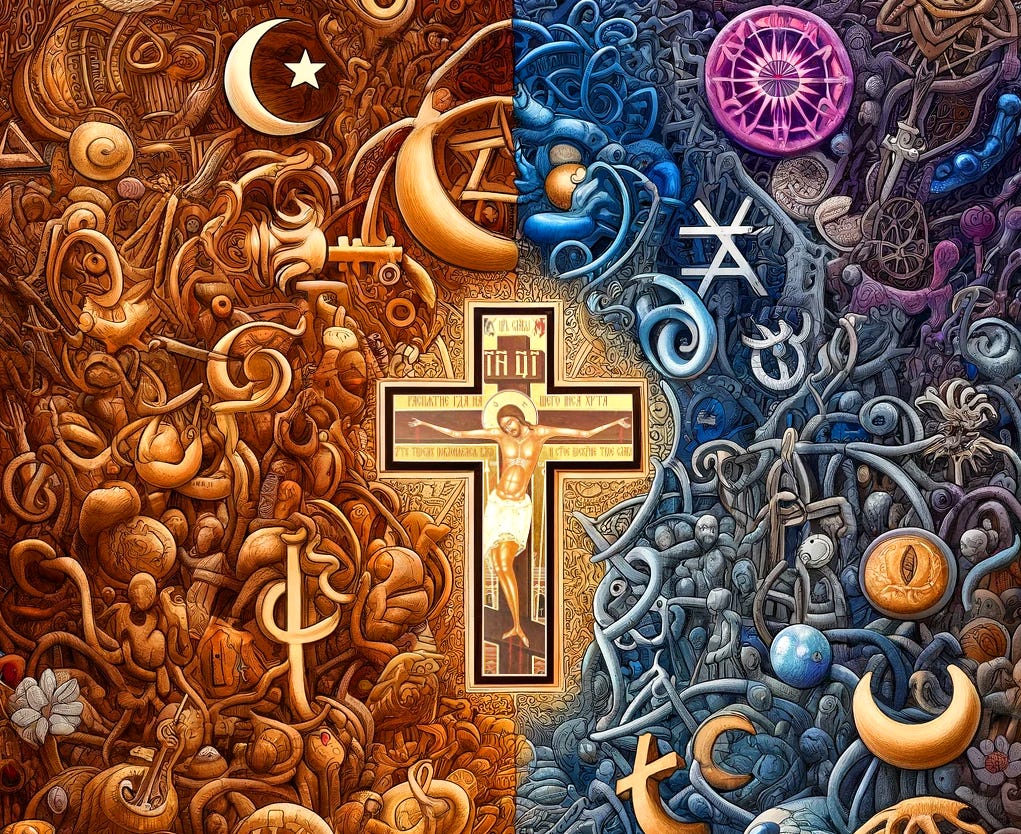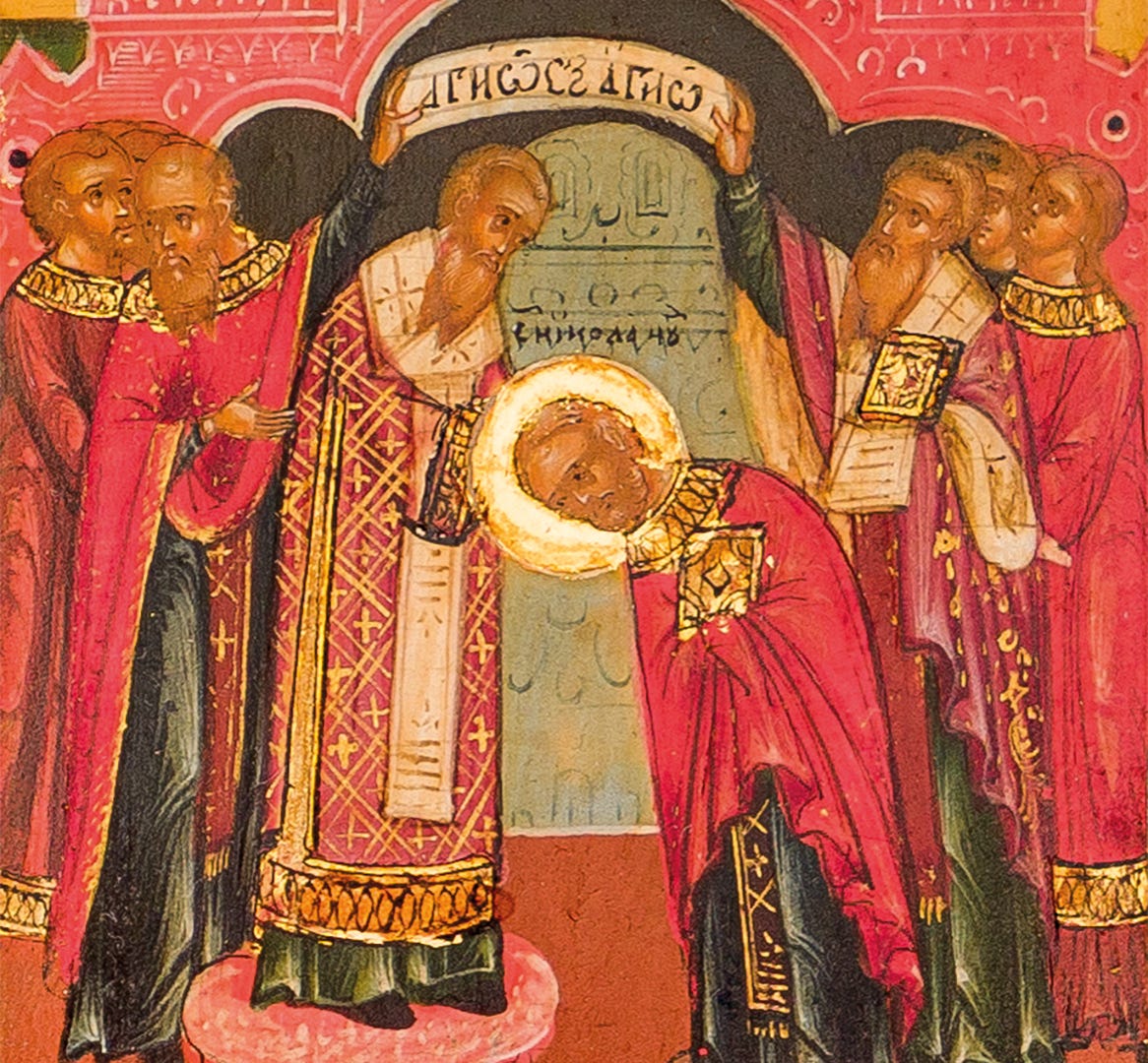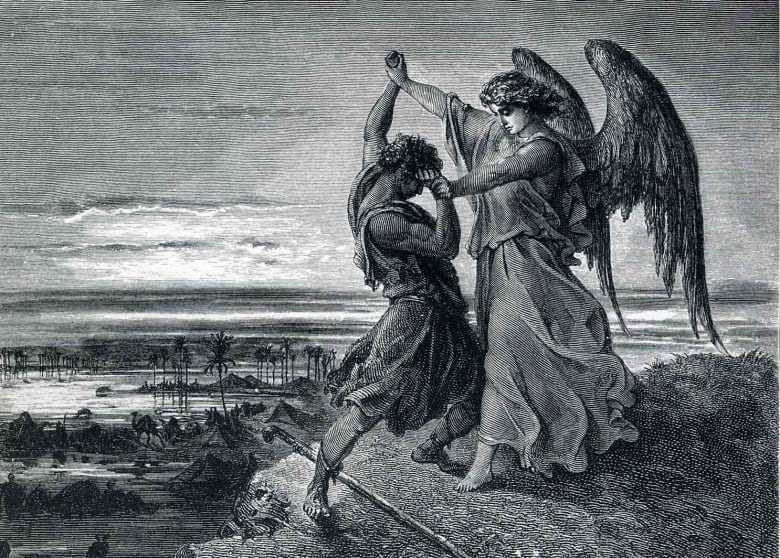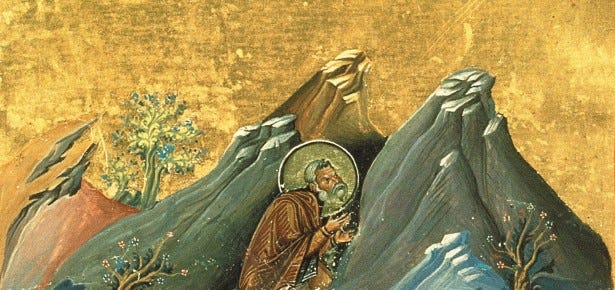Plato’s Armchair
After abandoning the incoherent world of atheism, I was something like a Platonic idealist, believing in transcendent principles of Truth and Beauty that weren’t constrained by the limits of the material world. But this wasn’t a complete picture of reality. I didn’t have any explanation for where Truth or Beauty come from, how they can be apprehended by humans, and why people were separated from this knowledge in the first place.
I traced my steps backward from known “core beliefs,” searching for a full theory that could explain the meaning of life. While I was evaluating the many “systems” of ideologies, several principles were important to me:
The system must not be self-contradictory. If a belief is in conflict with itself, then it cannot be true. An example of this is the claim that “all truth is relative,” which cannot itself be an absolutely true statement.
The system must give an account of itself. It needs to have some explanation for why it does not die under its own judgment. For example, someone who says “humans are just irrational animals” must tell us why he, a human animal, is immune to his own criticism.
Who made the system, and why? The individual personhood of the system’s creators cannot be ignored. The authors must be “reasonable” people whom I would respect and admire if I were to meet them in real life.1 For example, I do not respect the beliefs of New Age spiritual “gurus” who abused their authority to indulge in illict romantic relations with their own students.
Traditional religion became appealing to me because it had the backing of thousands of years of history, culture, and philosophy, lovingly and sincerely passed through many generations from teachers to students, holding itself accountable to daily practices and written standards of orthodoxy. In contrast, the tiny, provincial, self-limitedness of modern atheism and “enlightenment ideology” was artificially constructed 300 years ago by a peculiar, self-indulgent, and — in many cases — murderous group of people who not only thought they were smarter than and superior to their own ancestors but also didn’t consistently hold themselves accountable to anything they wrote.
I reckoned that everyone in the world is religious, but only some are conscious of what faith they follow. As a diligent student of the modern academic system, I knew for sure that we couldn’t trust our own minds to re-invent modern science or mathematics. Would you fly in an airplane designed by an engineer with zero teachers and who claimed to come up with his own alternative to algebra? Of course not. So how can you stake your very soul, your own definition of right and wrong, and the entire purpose of your life, on the flimsy foundations of unexamined, unserious moral theories?
The Boundaries of Tradition
Frithjof Schuon and the perennial philosophy appealed to me because they were intellectually rigorous — slow to believe and not “superstitious,” rejecting many of the false dogmas of modern philosophy, preserving the objectivity of the truth — while still accounting for the diversity we see in the many faiths, opinions, and theories of the world. He wrote with contempt and hostility against the hyper-relativism of the modern era:
Relativism reduces every element of absoluteness to relativity while making a completely illogical exception in favor of this reduction itself. Fundamentally it consists in propounding the claim that there is no truth as if this were truth or in declaring it to be absolutely true that there is nothing but the relatively true; one might just as well say that there is no language or write that there is no writing.…2
It is abundantly evident that man can escape subjectivity, for otherwise he would not be man; and the proof of this possibility is that we are able to conceive of both the subjective and the surpassing of the subjective. This subjectivity would not even be conceivable for a man who was totally enclosed in his subjectivity; an animal lives its subjectivity but does not conceive it, for unlike man it does not possess the gift of objectivity.
- The Contradiction of Relativism, Frithjof Schuon
The perennial philosophy preaches that every great religious tradition leads to the truth, but it also warns its followers to avoid heresy and maintain orthodoxy. This might sound weirdly zealous and intolerant, but it makes sense from a systems perspective. If every religion is a “system” with its own different axioms, then “heresy” would be a violation within the system, a contradiction. We can pay respect to the individual traditions, which are complete in themselves and on their own rights, but we refuse to mix those systems together: no picking and choosing.
This made sense to me when I considered that even eastern religions like Daoism and Buddhism — commonly seen as “tolerant” and “non-dogmatic” these days — have historically had their own struggles for orthodoxy and occasionally engaged in persecution of heretics. Traditional Zen teachers, most certainly, did not allow the student to simply believe in whatever he wanted; the monks were subjected to rigorous training and frequent discourse with a master, and they were rejected and even beaten for giving wrong answers. Both Zhuang Zi and Nagarjuna engaged in discourse to separate what was wrong from right, which implies that they believed in a truth and did not think that every single arbitrary statement was correct. In mathematics, we know that a single problem under a single set of axioms will have a single set of answers. So why should philosophy, which is ontologically prior to both math and science, be any different?
Frithjof Schuon taught about religious obedience, a concept that might sound shocking and scandalous to modern readers who have become accustomed to always having their own opinions and following their own interests, but which appealed to me at an intuitive level when I reflected on the process of learning other difficult matters in this world. I thought about Japanese swordsmiths who dedicated their entire lives to the craft, living under the authority of a strict teacher before graduating to independence, obsessing over esoteric details for many years before producing the perfect blade. Just as we can’t follow our own self-willed impulses when pursuing craftsmanship, so too must we study under the authority of teachers when pursuing the good life, which, in a way, is the craftmanship of one’s own character.3 And the teachers themselves were taught by teachers, all the way back up until the beginning, and that lineage of teachers and disciples is known as tradition.
At fifteen my heart was set on learning; at thirty I stood firm; at forty I had no more doubts; at fifty I knew the will of heaven; at sixty my ear was obedient; at seventy I could follow my heart's desire without overstepping the boundaries of what was right. - Confucius
Ashes and Fire
Although I loved reading Buddhist, Daoist, and Neoplatonic philosophy in my spare time, I had serious doubts that the authentic religious practices of these traditions were even possible in modern America, as they had only been imported within the last 70 years. Since I am myself a Chinese American with a Confucian upbringing, I intuitively grasped how westerners misinterpreted Eastern religions to satisfy their own wishes, cherry-picking their favorite ideas and “meditation” practices without making sacrifices or seriously holding themselves accountable to authorities within those traditions. Although they would call themselves Buddhists, sometimes even ordaining themselves as gurus, they would not have proper dharma transmission, refused to learn Eastern languages, and would still be beholden to Western ideas of individualism. Alan Watts, Thomas Merton, and Sam Harris are major representatives of what I would call westernized Buddhism. The mindset of this type of person is described well by Father Seraphim Rose, himself a former student of Chinese traditional religion:
At base, this ex-Anglican priest [Alan Watts] wanted a religion that he could be comfortable with, that promised him spiritual benefits while allowing him to do basically whatever he wanted; and he used his very able mind to both formulate and justify this amorphous religion. Zen, with its aversion to dogma, proved malleable in his hands.
While Guénon [a perennialist philosopher] had attempted to study Eastern religions within their own context, Watts seemed to be trying to make them digestible to Westerners. The “Buddhism” he espoused as a remedy for the spiritual malaise of the West was thus an inauthentic, synthesized expression of that tradition, streamlined to cater to the modern mentality of self-worship. […]
Watts himself admitted to being a charlatan and claimed to be nothing other than a “philosophical entertainer” — though he said this with a twinkle in his eye that made one imagine that there was something more to him. He did not accept the disciplines of the Eastern religions he was espousing, and argued with Zen masters and swamis who told him what their religions demanded. […]
Looking back, it is obvious that he had simply caught the right wavelength, followed it all the way and made his career out of it, made lots of money, and attracted many followers. Some of what he taught was true, especially about what is wrong with contemporary civilization. But he gave only some pitifully small shred of truth combined with a lot of his own opinions, and in the end a great system of lies; and he destroyed souls, including his own undoubtedly.
- “Father Seraphim Rose: His Life and Works,” Father Damascene Christensen
Because of my desire for authentic tradition, I chose to personally practice Christianity. I reckoned that this faith was indeed the tradition that enlightened the western peoples, and its psycho-spiritual influence could be measured in the very language of English, which had been profoundly reshaped and re-invented by the King James Bible in the 17th century. Although Christianity has been declining in influence in the modern age, it can never be completely ignored, as the Christian ethos has saturated the Roman Empire, and its faraway peripheral province of the USA, for hundreds and thousands of years: in law, culture, customs, and even in unconscious thinking patterns.
I also had great respect for the idea of bishops as living witnesses of tradition, exemplified in the concept of apostolic succession: meaning that the leaders of the Christian Church can trace their origins — both physically and spiritually — to the actual apostles in the Bible who were hand-picked by Jesus Christ. Many of these lineages are openly available online for anyone to verify. The bishops themselves are never supposed to create their own arbitrary and self-willed beliefs but rather remain faithful to what was passed down to them since the very beginning.
Reading the Gospels, I deeply resonated with its depiction of right and wrong, truth and delusion, depicting the stubbornness of people who refuse to listen and constantly run away from criticism. Seeing people who, in their pride, continued to do what they knew was incorrect, and even turned around to persecute those who dared to proclaim the truth, matched well with my own experiences in the fallen material world and the irrational interminality of modern ethical discourse. Even when I was an atheist kid, I hated people who created obviously self-serving theories that simply justified whatever decisions they’d already made, and reading the Bible as an adult, I saw such behavior clearly outlined as the product of a blind and irrational heart.
And this is the condemnation, that the light has come into the world, and men loved darkness rather than light, because their deeds were evil. For everyone practicing evil hates the light and does not come to the light, lest his deeds should be exposed. But he who does the truth comes to the light, that his deeds may be clearly seen, that they have been done in God. - Gospel of John (NKJV)
I also greatly admired the idea of confession as practiced in ancient Christianity, a way for holding yourself accountable to your actions and for directly admitting that what you did was wrong. Not only was this practice required before participating in the sacraments of the Church, but it was even mandatory for the salvation of the soul! As a former atheist, the concept of this ritual was mind blowing to me. I was so tired and demoralized from the rank hypocrisy and lack of accountability I had seen in public life, and even of major stakeholders in our society — CEOs, politicians, and artists — who seemed to always dodge questions asked to them and refused to admit to nakedly obvious wrongdoings. The idea of confession was a breath of fresh air. It harmonized nicely with my learning from Aristotle: the idea that knowledge isn’t simply an intellectual concept, but the active rejection of hypocrisy, the practical pursuit of good behavior to conform one’s actions with the truth.
Gripes with Christ
As I continued my research, I made some “progress” in my study of this religion by comparing Christian ideas with concepts I’d seen in other religions. For example, it was appealing to conceive of the Christian Logos, the Son of the Father, and the name “I AM THAT I AM” as being equivalent to the Neoplatonic Nous, which is a concept that refers to the eternal existence containing all truth, possibilities, and ideas. Similarly, the Dao (道) of Chinese philosophy, which self-sufficiently exists and generates all things, and yet cannot be named or known, seemed very similar to God the Father to me. Although I see now that this was a bad habit, it helped me in my early days of wrestling with faith by mapping Christianity with familiar concepts that I understood and respected.
Some inquirers, even faithful Christians, struggle with the problem of evil, the question of why a good God would permit tragedy and unhappiness to exist in His perfect creation, but I suspect that many ex-atheists do not find this question to be too perplexing. For me personally, I found satisfaction in Zhuang Zi’s speculation that this life is like a dream: we experience great pains and terrors in our nightmares, but these are quickly forgotten when we wake up and enjoy the comfort of the sun. If this world is a computer simulation (as some transhumanists have declared), then “waking up” from the Matrix could be infinitely more valuable than any evil that happened in the simulated world. It is openly taught in the Bible that the Christian Heaven is supposed to last for eternity, so how can any “logical atheist” complain about the momentary bitterness we experience on earth? It would be like a child complaining about yucky medicine, a temporary unpleasantness that precedes a long-lasting cure.
As an ex-atheist, my biggest struggle with Christianity was the particularity of the Bible combined with its exclusive claims. The Gospels famously show that Jesus Christ said: “I am the way, the truth, and the life: no man cometh unto the Father, but by me.” The plain reading of the text seems to suggest that unity with Christ is a prerequisite for approaching God the Father, and it’s a difficult teaching for modern people who are generally afraid of believing in doctrinal pronouncements. Why did Jesus of Nazareth, the God of the Christians, have to be born in the land of Judea? Why did He choose to make himself known through a peculiar tribe of people in a world with so many different nations? Why did He have to walk around wearing sandals in the desert, speaking the languages of Aramaic and Greek? Wasn’t this whole story just arbitrary and random?
But I was helped tremendously when I flipped the question around: in order for God to meet us at the level of humans, how could He not become particular? We see similar things happening all the time in the world of applied math, when a multi-dimensional vector needs to be projected onto a space with fewer dimensions, like a ray of sunshine hitting a piece of paper. It seemed reasonable for God to “compress” Himself down to the level of humans, maintaining His divinity while still existing in the world, not because of His arbitrariness, but owing to our own needs as small and limited people. Just as a company has to choose one particular person if they want a CEO, likewise, God has to become a particular person if He wants to be incarnate in our times — and that one person would be the best possible human across all time and space, measured in a way knowable to God Himself. For the perennialist, seeing Christ proclaim “I am the truth” is not a sad story of truth becoming broken and diminished in relativity, but the joyful mystery of the all-encompassing God making Himself knowable in the little world of ordinary humanity.
“Today the Virgin gives birth to the Transcendent One, and the earth offers a cave to the Unapproachable One! Angels, with shepherds, glorify Him. The wise men journey with a star, since for our sake the Pre-Eternal God was born as a young Child.” - Kontakion of the Nativity
Truth is a Person
Perennialism, in practice, led me to live a double life. I would read the Bible and attend Christian “non-denominational” events with my friends, but on the other hand, the gaps in my spiritual and intellectual diet would be filled by outside sources that weren’t within the Christian tradition. I justified this at the time by saying “they all point to the same ultimate truth,” but in a way, it made me unable to fully and seriously participate in the living tradition that was right in front of me. Due to this sense of distance, I was not able to fully put my heart into my prayers. I also was not able to empathize with frustrated Christians who had serious intellectual dissatisfaction with the watered-down version of religion they were experiencing in the modern churches, since my mind wasn’t even a part of the same faith framework as them.
During my private research, I eventually stumbled upon the Desert Fathers: early Christian monks who sold all their possessions, rejected the cities, and lived in the wilderness in order to cultivate the truth at all costs. Like the martyrs of the early church, these monks truly paid the price for their own beliefs, undertaking great physical trials, all-nighter prayer vigils, and the pain of humility and repentance. I fell in love with the beautiful, sober, and concise expressions of their faith, which talked about the practical acquisition of the virtues and the path of spiritual improvement.
“It is dangerous for a man to try teaching before he is trained in the good life. A man whose house is about to fall down may invite travellers inside to refresh them, but instead they will be hurt in the collapse of the house. It is the same with teachers who have not carefully trained themselves in the good life; they destroy their hearers as well as themselves. Their mouth invites to salvation, their way of life leads to ruin.” - Sayings of the Desert Fathers
Within the Desert Fathers, I recognized the spiritual athleticism of Aristotle, the wisdom of Zhuang Zi, and the piety of Iamblichus. The reading helped me truly connect the dots between perennialism-in-theory and Christianity-in-practice, and it gave me the push to sincerely pursue a more ancient kind of faith. I thought for sure that I wanted to be part of the traditional church that embodied the spirit of the Desert Fathers. I also wished to partake in the Eucharist, the precious Christian sacrament of God descending into the world and offering His Body to be consumed by the faithful, which I believed to be of essential spiritual importance and was also staunchly advocated by the Desert Fathers themselves.4 It seemed obvious to me to reject Protestantism in light of its historical contingency (being easily traced to the movements of Martin Luther, who seemed to be rebelling against his own teachers) and self-contradictions (how can the Bible alone explain who compiled the Bible?).
Based on my understanding of church history at the time, I chose to pursue Roman Catholicism. I thought that this church was the successor of the Desert Fathers and a possessor of the ancient faith that enlightened the Roman Empire. Although I would later become Orthodox Christian, at the time I did not have any spiritual contact with people worshipping God all the way across the world in Greece and Russia (even though, as it later turned out, there was an Orthodox community within driving distance of my own hometown).
It would only be years later that I would truly encounter the Christian faith of the Romans and engage with prayers, philosophy, and an interior religious life that seemed exactly as if it were written in the same spirit as the Desert Fathers themselves. That’s a whole different story, full of providence and unexpected surprises, that I’ll elaborate on, with God’s permission, in Part 3, which is now available here!
If you liked (or extremely hated) this essay, check out the next part, available here: “Faith Without Irony and the Byzantine Catholics.” You can also check out the previous article “Why I Left the Atheist Faith.”
See the discussion on Reddit, Twitter, and Instagram.
Yes, this means that I believe that ad hominem is not a fallacy when it comes to evaluating life-frameworks, since the life of the person espousing the belief is relevant to the question of whether his belief system works effectively.
It seems to me that the repudiation of relativism — “it cannot be true that all truth is untrue” — has become something like a new shahada for ex-atheists.
“The virtues we get by first exercising them, as also happens in the case of the arts as well. For the things we have to learn before we can do them, we learn by doing them, e.g. men become builders by building and lyreplayers by playing the lyre; so too we become just by doing just acts, temperate by doing temperate acts, brave by doing brave acts.” - Aristotle [Link]
"We believe, for our part, that the bread itself is the body of Christ as in the beginning, God formed man in his image, taking the dust of the earth, without anyone being able to say that it is not the image of God, even though it is not seen to be so; thus it is with the bread of which he said that it is his body; and so we believe that it is really the body of Christ.” - Desert Fathers [Link]










Thank you for this piece! Looking forward to part 3, God willing! God bless from Germany!
Thank you for another insightful post.